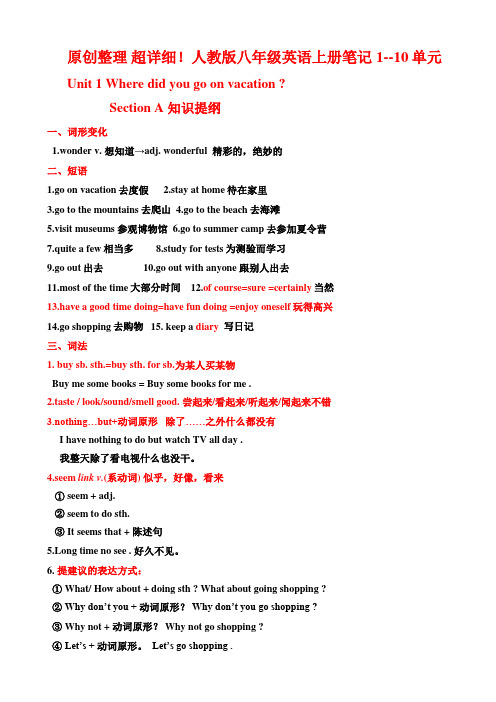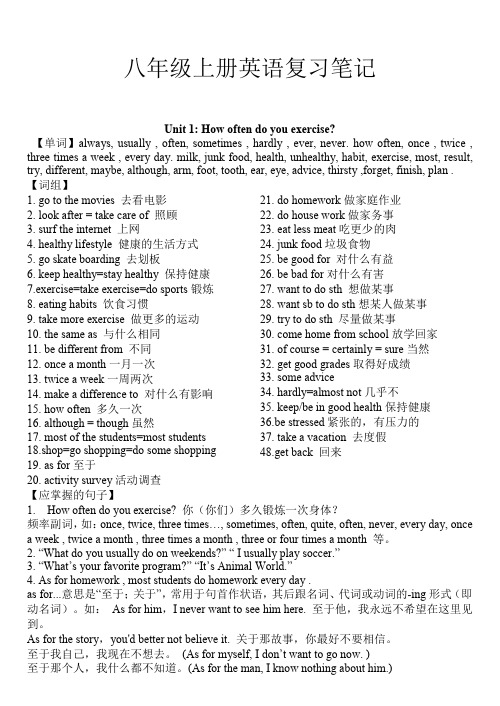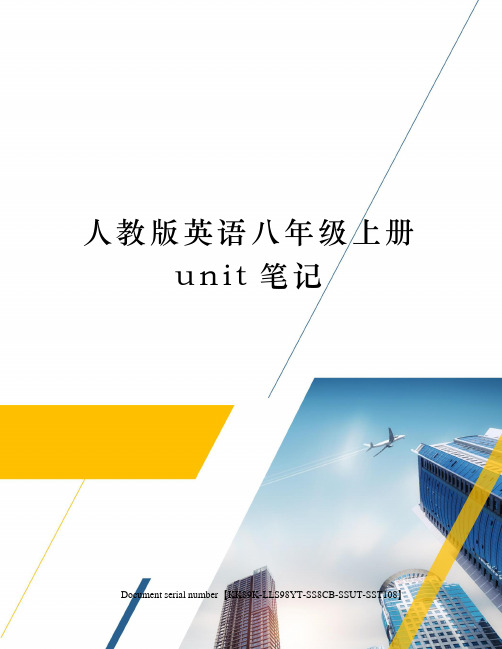人教 英语 八年级上册 单元知识点笔记
人教版八年级英语上册各单元知识要点

人教版八年级英语上册各单元知识要点Unit 1When is your birthday?1. 询问生日的方式:- When is your birthday?- My birthday is on (具体日期) + (月份) (ordinal numeral)th.- It's on the (具体日期) + (月份) (ordinal numeral)th.2. 表达年龄的方式:- How old are you?- I am (年龄) years old.Unit 2How often do you exercise?1. 表达频率的副词:- always 总是- often 经常- usually 通常- sometimes 有时候- rarely 很少- never 从不2. 频率副词在句子中的位置:- 常用于be动词、助动词或情态动词之后,行为动词之前。
Unit 3Why do you like koalas?1. 表达喜欢或不喜欢的方式:- Why do you like/don't like + 名词?- Because they are (形容词).- Because they are (形容词) + and (形容词).Unit 4What's the best movie theater?1. 表达最高级的方式:- What's + the + 形容词最高级 + 名词 (单数) ?- What's + the + most/least + 形容词 + 名词 (复数) ?Unit 5Do you want to watch a game show?1. 表达想要做某事的方式:- Do you want to + 动词原形 + 名词?- Sure./Yes, I do./No, I don't.2. 表达对某事感兴趣的方式:- Are you interested in + 名词/动名词?- Yes, I am./No, I'm not.Unit 6I'm going to study computer science.1. 表达将来计划、打算要做某事的方式:- I'm going to + 动词原形.- I'm + (具体时间) + going to + 动词原形.2. 表达将来计划、打算要做某事的原因:- Why are you going to + 动词原形?- Because + 原因.Unit 7Will people have robots?1. 表达将来会发生的事情:- Will + 主语 + 动词原形?- Yes, 主语 + will./No, 主语 + won't.2. 表达对将来的预测和想法:- I think + 将来的情况 + (will) + 结果.- Maybe + 将来的情况 + will + 结果.Unit 8How do you make a banana milk shake?1. 描述烹饪步骤的连词:首先,第一,接下来,然后,最后2. 描述烹饪步骤的动词:- peel 削皮- chop 切碎- blend 搅拌- pour 倒- mix 混合- serve 上菜Unit 9How was your weekend?1. 询问周末活动的方式:- How was your weekend?- What did you do on the weekend?2. 描述周末活动的过去式:- I (动词过去式) + (具体活动).Unit 10Where did you go on vacation? 1. 询问度假地点的方式:- Where did you go on vacation?- I went to (具体度假地点).2. 描述度假活动的过去式:- I (动词过去式) + (具体活动) on vacation.以上是人教版八年级英语上册各单元的知识要点,通过灵活运用这些表达方式和句型结构,可以更加流利地进行英语交流。
人教版英语:八年级上册各单元必考知识点汇总

人教版英语:八年级上册各单元必考知识点汇总Unit1 Where did you go on vacation?【重点语法】不定代词:不指名代替任何特定名词或形容词的代词叫做不定代词。
用法注意:1. some和any +可数名/不可数名。
some多用于肯定句,any多用于否定句、疑问句和条件从句。
有些问句中用some,不用any,问话者希望得到对方肯定回答。
2.由some, any, no, every与body, one, thing构成的复合不定代词作主语时,其谓语动词用三单。
3.不定代词若有定语修饰,该定语要置于其后:如:somethinginteresting【重点短语】1. buy XXX为某人买某物2. taste + adj.尝起来……3. nothing...but + V.(真相)除……以外甚么都没有4. seem + (to be) + adj看起来5. XXX抵达某地6. XXX do XXX决定做某事7. try doing sth.测验考试做某事/ try to do sth.极力做某事8. XXX喜欢做某事9. want to do sth.想去做某事10. XXX.入手下手做某事=XXX.11. stop XXX截止做某事辨别:stop to do sth.停下往来来往做某事12.XXX XXX.不喜欢做某事14.so + adj + that +从句如此……以至于……16. tell sb. (not) to do sth.告诉某人(不要)做某事17. keep XXX继续做某事18. forget to do XXX.忘记去做某事XXX忘记做过某事【词语辨析】1.XXX拍照quite a few+名词复数“很多…”2. seem +描绘词看起来…... You seem happy today.XXX.似乎/好像做某事I seem to have a coldIt seems +从句似乎..….It XXX.seem like ...好像,似乎…..It seems like a good idea.XXX小地址(注:若后跟地点副词XXX,介词需省略,如:arrive here;get home)4. XXX感觉像…XXX.想要做某事5. wonder(想知道)+疑问词(who, what, why)引导的从句。
人教版八年级英语上册笔记1--10单元(原创整理,超详细)

原创整理超详细!人教版八年级英语上册笔记1--10单元Unit 1 Where did you go on vacation ?Section A 知识提纲一、词形变化1.wonder v. 想知道→adj. wonderful 精彩的,绝妙的二、短语1.go on vacation去度假2.stay at home待在家里3.go to the mountains去爬山4.go to the beach去海滩5.visit museums 参观博物馆6.go to summer camp去参加夏令营7.quite a few相当多 8.study for tests为测验而学习9.go out出去 10.go out with anyone 跟别人出去11.most of the time大部分时间 12.of course=sure =certainly当然13.have a good time doing=have fun doing =enjoy oneself玩得高兴14.go shopping去购物 15. keep a diary 写日记三、词法1. buy sb. sth.=buy sth. for sb.为某人买某物Buy me some books = Buy some books for me .2.taste / look/sound/smell good. 尝起来/看起来/听起来/闻起来不错3.nothing…but+动词原形除了……之外什么都没有I have nothing to do but watch TV all day .我整天除了看电视什么也没干。
4.seem link v.(系动词) 似乎,好像,看来① seem + adj.② seem to do sth.③ It seems that + 陈述句5.Long time no see . 好久不见。
6. 提建议的表达方式:① What/ How about + doing sth ? What about going shopping ?②Why don’t you + 动词原形?Why don’t you go shopping ?③ Why not + 动词原形? Why not go shopping ?④Let’s + 动词原形。
人教 英语 八年级上册 单元知识点笔记

Unit1 Where did you go on vacation?1.过去式1.过去时态的结构:V+ed.2.过去时态的时间标志词:1.yesterday, the day before yesterday, just now, in the pastst +时间3. 时间+ ago4. in+ 过去的年,月3. 变一般疑问句:用Did来引导,动词变回原形。
(把Was/ Were 提前大写。
)4. 一般疑问句的回答:Yes,sb+ did. No, sb+didn’t.Yes, sb was. No, sb wasn’t. Yes, sb were. No, sb weren’t.5. 变否定句:在动词前加didn’t,动词变回原形。
(在was/ were 后加not, 缩写为wasn’t, weren’t )2.复合不定代词的用法:Something, anything, everything, nothing,Someone , anyone, everyone, no oneSomebody, anybody, everybody, nobodySomewhere, anywhere, everywhere, nowhere1. 复合不定代词作主语,谓语用单数。
Everyone is here. Someone likes English.2.形容词修饰复合不定代词,形容词放复合不定代词后面。
I did something special.3.反身代词的构成:一,二人称为形容词性物主代词+self/ selvesMyself, ourselves, yourself, yourselves三人称为人称代词宾格+self/ selvesHimself, herself, itself, themselvesLearn sth by oneself 自学help yourself (yourselves)to…. 请顺便吃。
人教版英语八年级上册 知识点笔记

人教版英语八年级上册知识点笔记
本文档是人教版英语八年级上册的知识点笔记,内容包括但不
限于以下几个部分:
Unit 1 重点知识
1. 表示时间的几种表达方法:on+具体日期、at+具体时间点、
in+时间段、every+时间段、once a week/month/year等。
2. 祈使句的用法及其五种基本句型:肯定祈使句、否定祈使句、let's句型、why not句型、would you mind句型。
3. 陈述句、疑问句、祈使句、感叹句四种句型的用法及转换。
Unit 2 重点知识
1. 过去完成时的构成及用法,表示过去已经完成的动作或状态。
2. 直接引语和间接引语的转换方法及其注意事项。
3. 一些常见的连词及其用法:although、as、because、since、when、while等。
Unit 3 重点知识
1. 现在完成时的构成及用法,表示过去发生的动作对现在造成的影响或结果。
2. 一些常见的副词及其用法:already、yet、just、never、ever 等。
3. 形容词的比较级和最高级的构成及其用法。
......
本文档只是对知识点进行简单概括,更详细的内容需要在课本和相关资料中学习和掌握。
同时,建议同学们进行课后练习和自我检测,加深对知识点的理解和记忆。
(完整word版)人教版八年级上册英语复习笔记

八年级上册英语复习笔记Unit 1: How often do you exercise?【单词】always, usually , often, sometimes , hardly , ever, never. how often, once , twice , three times a week , every day. milk, junk food, health, unhealthy, habit, exercise, most, result, try, different, maybe, although, arm, foot, tooth, ear, eye, advice, thirsty ,forget, finish, plan . 【词组】1. go to the movies 去看电影2. look after = take care of 照顾3. surf the internet 上网4. healthy lifestyle 健康的生活方式5. go skate boarding 去划板6. keep healthy=stay healthy 保持健康7.exercise=take exercise=do sports锻炼8. eating habits 饮食习惯9. take more exercise 做更多的运动10. the same as 与什么相同11. be different from 不同12. once a month一月一次13. twice a week一周两次14. make a difference to 对什么有影响15. how often 多久一次16. although = though虽然17. most of the students=most students18.shop=go shopping=do some shopping19. as for至于20. activity survey活动调查21. do homework做家庭作业22. do house work做家务事23. eat less meat吃更少的肉24. junk food垃圾食物25. be good for 对什么有益26. be bad for对什么有害27. want to do sth 想做某事28. want sb to do sth想某人做某事29. try to do sth 尽量做某事30. come home from school放学回家31. of course = certainly = sure当然32. get good grades取得好成绩33. some advice34. hardly=almost not几乎不35. keep/be in good health保持健康36.be stressed紧张的,有压力的37. take a vacation 去度假48.get back 回来【应掌握的句子】1. How often do you exercise? 你(你们)多久锻炼一次身体?频率副词,如:once, twice, three times…, sometimes, often, quite, of ten, never, every day, oncea week , twice a month , three times a month , three or four times a month 等。
人教版英语八年级上册unit笔记

人教版英语八年级上册u n i t笔记Document serial number【KK89K-LLS98YT-SS8CB-SSUT-SST108】八年级上册Unit1课堂笔记一、单词1、hardly [] adv.几乎不;几乎没有hard(坚硬的,困难的)+-ly(副词后缀)Eg:Hardly anybody came.几乎没有人来。
2、twice [] a dv.两次;两倍1)twice表示“两次”时,不和time连用。
2)在表示“一两次”时,要用or连接。
即:once or twiceEg: He goes to the cinema twice a month(对画线部分提问)How often does he go to the cinema?3、once []adv.一次Eg:I go to see a film once a week.我每周看一场电影。
常见的短语有at once 立刻;once again再一次。
▲表示一次、两次用once、twice。
表示三次或者三次以上用:数字+times (three times)4、health []n.健康;健康状况1)同根词:healthy adj.健康的;healthily adv.健康地2)相关的短语:be in good/poor health身体好(不好)Eg :You must learn to eat healthily and take exercise regularly.5、difference []n.不同;区别;差异1)它的形容词为different;2) difference 是可数名词。
Eg:Is her lifestyle the same as yours or What are theA.difference;differentB.different;differenceC.different;differences6、unhealthy []adj.不健康的;不益于健康的un-(否定前缀)+healthy(健康的)1)反义词healthy2)常作定语,如:I have an unhealthy habit.3)注意加前缀un变否定形式的词。
最全面人教版八年级上册英语各单元知识点总复习归纳总结

人教版八年级上册英语各单元知识点总复习归纳总结目录Unit 1 Where did you go on vacation? (1)一、词汇与短语 (1)二、语法知识点 (3)Unit 2 How often do you exercise? (16)一、词汇与短语 (16)二、语法知识点 (18)Unit 3 I'm more outgoing than my sister. (29)一、词汇与短语 (29)二、语法知识点 (31)Unit 4 What's the best movie theater? (39)一、词汇与短语 (39)二、语法知识点 (40)Unit 5 Do you want to watch a game show? (50)一、词汇与短语 (50)二、语法知识点 (51)Unit 6 I'm going to study computer science. (63)一、词汇与短语 (63)二、语法知识点 (64)Unit 7 Will people have robots? (76)一、词汇与短语 (76)二、语法知识点 (77)Unit 8 How do you make a banana milk shake? (94)一、词汇与短语 (94)二、语法知识点 (95)Unit 9 Can you come to my party? (109)一、词汇与短语 (109)二、语法知识点 (111)Unit 10 If you go to the party, you'll have a great time! (123)一、词汇与短语 (123)二、语法知识点 (124)Unit 1 Where did you go on vacation?一、词汇与短语● 重点单词A部分1.anyone pron. 任何人2.anywhere adv. 在任何地方3.wonderful adj. 精彩的;绝妙的4.few adj. & pron. 不多;很少5.most adj. adv. & pron. 最多;大多数6.something pron. 某事;某物7.nothing pron. 没有什么;没有一件东西8.everyone pron. 每人;人人;所有人9.myself pron. 我自己;我本人10.Yourself pron. 你自己;您自己11.hen n. 母鸡12.pig n. 猪13.seem v. 好像;似乎;看来14.bored adj.厌倦的;烦闷的15.diary n. 日记;记事簿B部分1.enjoyable adj.有乐趣的;令人愉快的2.activity n.活动3.decide v.决定;选定4.try v. 尝试;设法;努力5.paragliding n.滑翔伞运动6.bird n.鸟7.bicycle n.自行车;脚踏车8.building n.建筑物;房子9.trader n.商人10.wonder v.想知道;琢磨11.difference n.差别;差异12.top n.顶部;表面13.wait v.等待;等候14.umbrella n. 伞;雨伞15.wet adj.湿的;潮湿的;下雨的16.below prep. & adv. 在…下面;到…下面17.enough adj. & adv.足够的(地);充足的(地);充分的(地)18.dislike v. & n.不喜爱(的事物);厌恶(的事物)19.as adv.像…样;如同conj.当…时;如同20.hill n.小山;山丘21.duck n.鸭22.hungry adj.饥饿的● 重点短语A部分1.go on vacation 去度假2.stay at home 待在家里3.go to the mountains 去爬山4.go to the beach 去海滩5.visit museums 参观博物馆6.go to summer camp 去参加夏令营7.quite a few 相当多;不少8.study for…为…而学习9.go out 出去10.most of the time 大部分时间11.taste good 尝起来好吃12.have a good time 玩得高兴13.go shopping 去购物14.of course 当然;自然15.buy sth. for sb. /buy sb. sth. 给某人买某物B部分1.arrive in/at 到达2.decide to do sth. 决定去做某事3.try doing sth. 尝试做某事4.forget to do sth. 忘记做某事5.feel like给的感觉;感受到6.in the past 在过去7.wait for 等候8.because of 因为9.the next day 第二天10.take photos 照相11.find out 找出;查明12.up and down 上上下下● 重点句子A部分1.Where did you go on vacation? 你去哪儿度假了?2.Long time no see.好久不见。
- 1、下载文档前请自行甄别文档内容的完整性,平台不提供额外的编辑、内容补充、找答案等附加服务。
- 2、"仅部分预览"的文档,不可在线预览部分如存在完整性等问题,可反馈申请退款(可完整预览的文档不适用该条件!)。
- 3、如文档侵犯您的权益,请联系客服反馈,我们会尽快为您处理(人工客服工作时间:9:00-18:30)。
Unit1 Where did you go on vacation?1.过去式1.过去时态的结构:V+ed.2.过去时态的时间标志词:1.yesterday, the day before yesterday, just now, in the pastst +时间3. 时间+ ago4. in+ 过去的年,月3. 变一般疑问句:用Did来引导,动词变回原形。
(把Was/ Were 提前大写。
)4. 一般疑问句的回答:Yes,sb+ did. No, sb+didn’t.Yes, sb was. No, sb wasn’t. Yes, sb were. No, sb weren’t.5. 变否定句:在动词前加didn’t,动词变回原形。
(在was/ were 后加not, 缩写为wasn’t, weren’t )2.复合不定代词的用法:Something, anything, everything, nothing,Someone , anyone, everyone, no oneSomebody, anybody, everybody, nobodySomewhere, anywhere, everywhere, nowhere1. 复合不定代词作主语,谓语用单数。
Everyone is here. Someone likes English.2.形容词修饰复合不定代词,形容词放复合不定代词后面。
I did something special.3.反身代词的构成:一,二人称为形容词性物主代词+self/ selvesMyself, ourselves, yourself, yourselves三人称为人称代词宾格+self/ selvesHimself, herself, itself, themselvesLearn sth by oneself 自学help yourself (yourselves)to…. 请顺便吃。
4.Enough的用法:1. 直接修饰名词。
2. 修饰形容词,放形容词后面I have enough friends. 我有很多朋友。
She is beautiful enough. 她很漂亮。
5.Because of和because的区别:Because of+ 单词、短语because+句子例:I like English, because I like Kevin.Because of the bad weather, I didn’t go out on weekends.6.再。
几个,还。
几个:another+数字+名词= 数字+more+名词I’m still hungry. I want to have another 2 bowls of rice. / 2 more bowls of rice.7.as +adj/ adv + as +sb/sth 和。
一样。
He is as smart as a monkey. 他和猴子一样聪明。
He speaks English as well as Kevin. 他说英语说得和Kevin 一样的好。
8.多多少少的区别:Many+可数名词复数=a lot of= lots of= quite a few 许多的。
Much+不可数名词= a lot of= lots of 许多的。
A few+ 可数名词复数一些。
A little+ 不可数名词一点。
Few+ 可数名词复数几乎没有Little+ 不可数名词几乎没有(解题技巧:先看空格后面的名词是可数还是不可数,再根据句子意思是表肯定还是表否定。
)9.价格高低用high 和low 东西昂贵便宜用expensive 和cheapThe price of the book is high. / low 这本书的价格高。
低The book is expensive./ cheap 这本书贵。
便宜10.What do you think of…..= How do you like…..= How do you feel about…=How be…..固定搭配:1,Decide to do sth 决定做某事2,Feel like doing sth = want to do sth = would like to do sth 想要做某事3,Try to do sth 尽力做某事try doing sth 尝试做某事4,Sb seem to do sth= It seem (s/ed) that sb do sth 某人看起来好像要做某事5,Have a good time(in) doing sth= have fun doing sth= enjoy oneself doing sth做某事玩得开心6,Enjoy doing sth 喜欢做某事(finish,practice)7,keep doing sth 继续做某事keep sb doing sth 让某人保持做某事8,It’s one’s first time to do sth 某人第一次做某事9. wait for sb / sth 等某人/某物can’t wait to do sth 迫不及待做某事10. come up 升起来11,arrive at+ 小地点arrive in+大地点= get to+地点= reach+地点重点句型: 1. I visited my uncle and I also visited the museum.翻译:我拜访了我的叔叔,也参观了博物馆。
2. I didn’t really see anything I liked.我真的没有看见我喜欢的一些东西。
3.What a difference a day makes!多么迥然不同的一天啊!重点词汇:1.go on vacation 去度假go to sw. on vacation 去…..度假2.be on vacation 在度假be on vacation in sw. 在。
度假3.stay at home 待在家里4.go to summer camp 去夏令营5.go to the beach 去海滩6.quite a few 相当多7.of course 当然8.do something interesting 做有趣的事情9.study for a test 备考10.get bored 感到无聊11.keep a diary 写日记12.rain hard 下大雨= rain heavily13.a bag with food and water 装有食物和水的包14.visit the museum 参观博物馆重点单词:Anyone, anywhere someone, something, everyone, myself, yourself, quite a few, wonderful, seem, bored, try, difference, wait, because of, below, enough, as, dislike, activity, diary, nothing, most,Unit2 How often do you exercise?1.频率副词:Always 总是usually经常often常常,sometimes有时,hardly ever几乎不,never 从不100% 90% 70% 40% 5% 0%频率副词的用法:be或情态动词之后,实意动词前。
I’m always on time. I hardly ever arrive late.频率词:every day 每天, once a week一周一次, twice a week一周两次, three times a week一周三次, one or two times a week,一周一两次,three to five times a week,一周三到五次对频率提问用How often 多久一次。
I play basketball twice a week. -------- How often do you play basketball?注意:对次数提问用How many times, 对段时间提问用How longI play basketball twice a week. ------- How many times do you play basketball a week?I play basketball twice a week. ------ How long do you play basketball twice?2.Although 尽管,虽然,不与but 连用。
用其一(because 与so 也不能连用。
)=thoughAlthough he is 5 years old, he can speak English very well.He is 5 years old, but he can speak English very well. 尽管他5岁,但是他说英语说得非常好3.对百分数提问用:What percent of....Twenty percent of students like you.------ What percent of students like you?百分数+of +名词,作主语,谓语动词在人称和数上与名词一致。
Twenty percent of students are boys.Twenty percent of water is bad.4.However, 作副词,表示转折,意为“然而,但是”,可位于句首,句中,句末,通常用逗号与其他句子隔开。
5.Hardly 和hard,hardly ever的区别:Hardly,副词,几乎不,表否定,hard 副词努力地,形容词困难的,坚硬的,Hardly ever, 频率副词,几乎不6.Health与healthy的区别:Health名词,健康healthy 形容词,健康的。
Keep in good health, = keep healthy 保持身体健康7.Through=by,通过,凭借介词+ving/名词、代词,穿过,表示在物体中间穿过,through the park 穿过公园through the forest 穿过森林go across=cross, 表示在物体表面穿过8.None和no one 的区别。
None,表示全都不,(三个或三个以上)可指人,也可指物。
